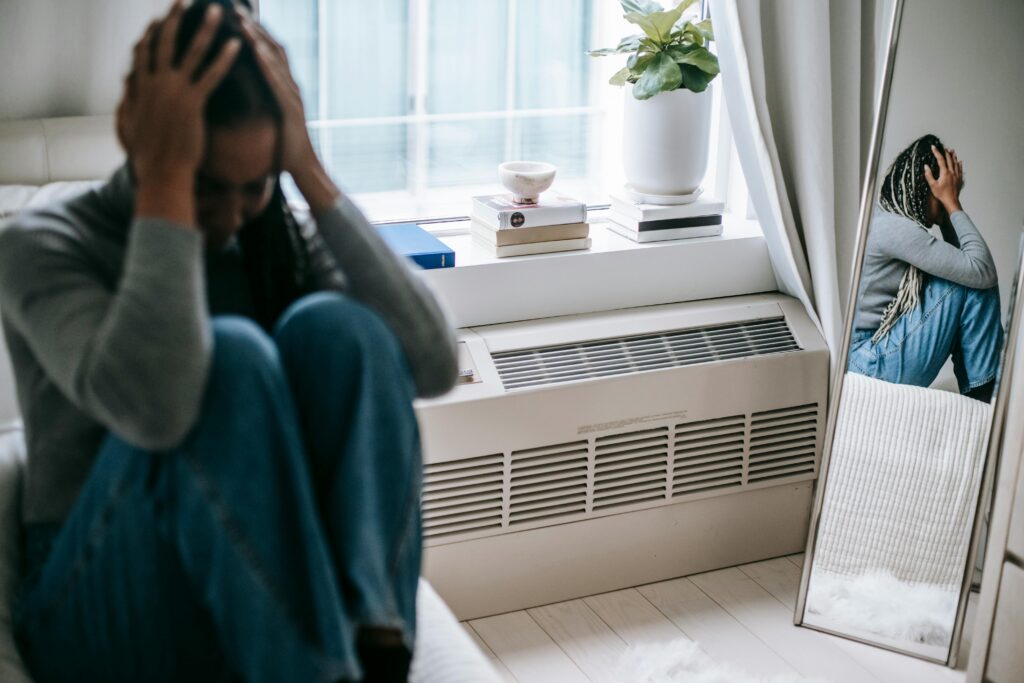Anxiety has this tricky mechanism of finding its way into one’s head, and can be very persistent. It could present itself as palpitations during a business presentation, not being able to sleep because of what tomorrow might bring or general anxiety that doesn’t have a clear reason.
Anxiety is perhaps one of the most common disorders categorized under the mental health disorders throughout the universe.
But here’s the good news, anxiety can give a person an enormous feeling that the world is on them but there are ways one can decide to break the cycle and live a quiet life.
More specifically, this guide will offer real-life, research-backed tips on how to overcome anxiety and bring order out of the current disarray.
Understanding Anxiety

Stress or threat leads to anxiety, which is a normal body response. This is your brain’s way of getting you ready for a fight or flight situation.
Of course, some level of anxiety is actually good because that is what makes you prepare for an exam or be vigilant in dangerous situations but when this kind of anxiety reaches an extreme, becomes too frequent, gets in the way of your ability to do things or is impossible to control, then it becomes a problem.
This is why it is important to know when anxiety can be considered a problem to the human life and there are two major ways to identify which level of anxiety one has gotten to.
- Normal Anxiety: This is a short time feeling often not fixed or permanent, such as being scared while preparing to deliver an oral report.
- Anxiety Disorders: This is chronic and severe, it can affect a person’s activity within the day and thereby disorganized one’s way of living. These are generalized anxiety disorder, panic disorder, and social anxiety among others.
It is important because by knowing when they are distinct, you know when one must ask for assistance and when one has to rely on coping mechanisms.
The Anatomy of Anxiety
Anxiety is not only about a mental health disorder, but a person’s physical health which would also be affected. Recognizing its symptoms can help you understand how anxiety manifests and why addressing it requires a holistic approach:
- Physical Symptoms: Pounding of the heart, tightening of muscles, tiredness, perspiring, or having a queasy feeling in the stomach.
- Mental Symptoms: Feeling raced, insomniac or panicky, unable to focus on different aspects of life, or having an acute fear of death.
- Emotional Symptoms: Feeling agitated or grouchy, having race thoughts or being easily wound up.
Anxiety is the kind of thing that tends to be self-perpetuating. For instance, thinking about an event could make one develop a fast heart beat which in turn causes anxiety.
Root Causes of Anxiety

Anxiety does not occur from out of thin air. Identifying its roots can help you target your strategies:
1. Stress: Hormonal changes, past or current stress from work, relationships, or financial problems can cause anxiety.
2. Past Experiences: Adverse events can form scripts that will persist when one is exposed to similar situations in the future.
3. Biological Factors: The genetic as well as the chemical composition of the brain can incline some individuals towards anxiety.
4. Negative Thought Patterns: Magnifying the situation or in other words, perpetually anticipating the worst makes anxiety worse.
5. Lifestyle Choices: Short night and sedentary lifestyles, and high caffeine or alcohol consumption can worsen the condition.
It’s always to understand what may actually aggravate or worsen anxiety as this will help one to come up with better strategies on how to deal with it.
Read More
How to Maintain Healthy Kidney
7 Habits of Effective Teens
10 Ways to Overcome Anxiety
Anxiety requires not only changes in thinking but also changes in the way one lives their life and mughals of coping skills. Here is a list of 10 practicable steps to how to overcome anxiety.
1. Recognize and Admit Anxiety
The first thing you’d need on how to overcome anxiety is admit it. If one tries to stop or avoid having such thoughts, they tend to amplify. However, it is better to attempt to recognize them.
Practice saying words like “I am afraid and that is a good thing” It’s a normal response.
Cultivate an attitude of mind that lets you watch your thoughts as it is. Better look at them as passing showers in the sky and not a few days’ storm one is a prisoner of.
It’s part of life but it does not rule your existence; it does not control you accept it even when it would not go away at once.
2. Challenge Negative Thoughts
Worry is fueled by the negative cognitive processes that are never founded on the actual reality. Such things as thinking ‘I am going to fail’ or ‘what if something bad happened?’ are rather terrible. Reframe these thoughts by asking:
“Are these proving to be facts or just assumptions?”
“What is the worst case scenario I could anticipate, and how would I deal with it?”
For instance, if you have worries about a job interview, counter the thought of “I will screw this up” with positive past experiences and preparation.
3. Adopt a Healthy Lifestyle
As you can already imagine there is this strong link between the body and the brain as the command center. A healthy lifestyle can significantly reduce anxiety levels.
Exercise Regularly: Engaging your body in exercises also helps to relieve stress because it frees stress-releasing chemicals in the body. Even half an hour walk can go a long way in helping the cause.
People should be sleeping for about 7 to about 9 hours every night. Also do not go to bed without having some kind of format or process by which you will get yourself prepared for sleep.
Eat Balanced Meals: As earlier mentioned omega-3 fatty acids for instance fish like salmon and magnesium like greens are known to aid the brain.
Limit Stimulants: Although some research has shown that caffeine does not worsen anxiety disorder, it is still advisable to avoid its use while taking this medication, as well as alcohol that tends to in-flare anxiety symptoms.

4. Learn Relaxation Techniques
If you have any degree of anxiety, you have to know how to bring your body to a state of rest so your mind enters that state as well. Try these techniques:
- Deep Breathing: It is good to try to have some technique in breathing like inhaling through nose, full breath, hold it for some seconds before exhaling through the mouth completely. It stimulates the parasympathetic nerve which makes you relax.
- Progressive Muscle Relaxation: Contraction and relaxation of different muscles of the body for the purpose of alleviating tension in the muscular system.
- Mindfulness Meditation: In this case, this will help one avoid thinking of the future or past events but the actual ones happening in the present. Services like Calm and Headspace are good to use when it comes to the sessions.
5. Have Personally time: Privacy, Restrictions and Self-Love
Stress is commonly caused by the workload or time management issues, more specifically, the lack of it. Learn to Say No, Being conscious about who you are around will also prevent you from wasting your energy through communication limits with work, friends or family.
Schedule Downtime: Make sure you spend 20 to 30 minutes of your day in restful activities like listening to music, reading, drawing or having a bath.
Create a Routine: Living routine can help to achieve stability where the mind daily struggles with anxieties.
6. Divide Work In Small Parts
Stress may occur in the form of anxiety that makes tasks seem very gigantic. Instead of tackling everything at once, break them down, Draw a schedule to work on and be sure it contains a list of things to do.
Emphasize on extending working on one small productive goal that will likely be accomplished.
For instance, if you are stressed on how to coordinate an occasion, make the first call or send out the first email. Small victories are cumulative too and take pressure off of us.
7. Limit Exposure to Triggers
Coming face to face with fears is okay but sensitive attempts should be made to ensure that potentially evoking stimuli are avoided.
For instance, avoid spending more time on browsing the news that is only negative.
Use some space if you find yourself unable to cope with certain social experiences – step back for a while.
8. Build a Support System
People who tend to feel anxious tend to feel less alone whenever they try to tell it to other people. Reach out to people who you can be vulnerable with, people who you can count on in terms of emotional support.
Join outlets where people with related issues can convene. Counsellors or treatment givers who can offer the approaches touching on anxiety such as the cognitive behavioural therapy (CBT).
9. Use Anxiety-Specific Tools
Technology can play an important role in helping to tame anxiety. Some tools include:
– Apps: Serene, meditation, or MyLife for those in need of meditation and general stress relieving sessions.
– Journals: Include triggers in the prompts so that you can keep track of them and combine this practice with gratitude.
– Workbooks: Based on the information, use anxiety specific guides to learn how to self soothe.
10. Be Patient with Yourself
Change is slow, and there will always be some form of push back from the community. Treat yourself gently when using these techniques.
It is good to count the small achievements, such as having not felt overwhelmed during the entire day, or being able to regain control during a panic attack.
Conclusion
Learning how to overcome anxiety is a process and not a one time event. It’s about creating armour and making oneself ready for the battle of life.
Do not forget that anxiety is only a part of you, a small and temporary story you are telling yourself. Using these strategies you will be able to take definite actions towards attaining living in harmony.
Remember that everyone gets anxious once in a while, so first, try to take one small step toward change, then another, and then another… And as you keep edging forward, you will find that you have achieved a good measure of calm at work.
